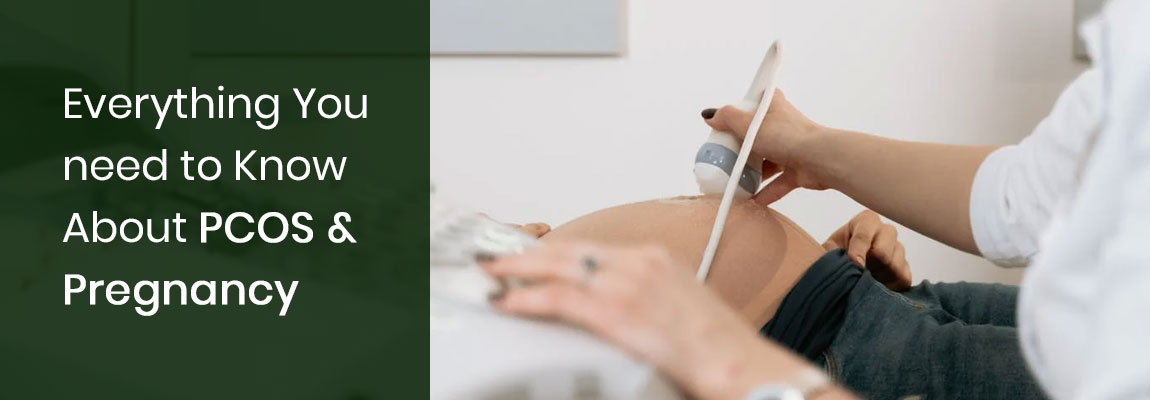
Polycystic ovary syndrome, known as PCOS, is a pretty common hormone disorder that can cause problems like missed periods, acne, and trouble getting pregnant. It happens when a woman’s ovaries produce too many male hormones and sometimes develop small fluid-filled sacs. Despite its name, not all women with PCOS have these cysts, and some women without PCOS do.
Impact of PCOS on Fertility
When a woman ovulates, her body releases one mature egg from the ovary. This can be fertilized by sperm from a male. Otherwise, if it is not fertilized, then it will be cleaned out of her body with the period flow.
Sometimes, a woman’s body doesn’t make enough hormones to support ovulation. When this happens, her ovaries can develop many small cysts, which produce hormones called androgens. Women with this condition often have high levels of androgens, which can knock their menstrual cycle out of balance and cause additional symptoms.
The irregular periods are accompanied by cysts on the ovaries, which make it harder to get pregnant. These types of cysts produce hormones that can affect the menstrual cycle and fertility. On the other hand, women with PCOS who are under 35 years old and ovulate regularly still have a chance to become pregnant without trying. If they have trouble, they may opt for fertility treatments. The treatment for this case usually involves medication. This would, in turn, reduce the number of problems caused by the condition, besides averting health problems since it cannot cure the condition.
Relationship Between PCOS and Pregnancy Symptoms
If you happen to have PCOS, you may confuse its symptoms with those of pregnancy. It can be hard to tell if you’ve missed a period because of PCOS causing irregular menstrual cycles. Tracking your ovulation can help you keep better track of your period.
Medication taken to treat PCOS, like metformin or Progesterone, can bring about symptoms similar to pregnancy, such as nausea, vomiting, and tender breasts. In case of a year of attempted conception without success, it would be a good idea to visit a specialist for testing for PCOS or how to manage the symptoms associated with weight loss or some medications.
How Can a PCOS Specialist Help?
Visiting a specialist doctor can be really helpful. A PCOS Specialist knows everything about PCOS and can contribute a lot toward increasing your chances of getting pregnant—advising about lifestyle changes, eating healthily, and exercising more, which oftentimes make a world of difference; they may prescribe medication to help with whatever symptoms might arise and show up with their attendant “what” and “why.” What’s more, they can help you design a plan according to your needs. This can be a great way to help make a living with PCOS much easier and less frustrating when the goal is pregnancy.
Managing PCOS for Pregnancy
PCOS is a problem in childbearing women; therefore, it complicates pregnancy in a woman. Maintaining PCOS for pregnancy would involve changes in routine lifestyle and sometimes even medication to regularize ovulation and conceive.
Maintaining a healthy body weight through a balanced diet supplemented with regular exercise is a very important factor in managing PCOS for pregnancy. This will help the body become more responsive to insulin and balance out hormones—both critical to fertility. At the same time, anxiety/stress levels should be controlled, along with good sleep; it’s important for women with PCOS who are trying to conceive.
In some cases, doctors can prescribe medications that will help women with PCOS get pregnant. These medications regulate ovulation and improve the chances of conceiving. It’s very important that women with PCOS who are trying to get pregnant work closely with their healthcare provider. It can be helpful for them to find personalized solutions based on their health needs and personal goals.
Complications of Pregnancy with PCOS
Pregnancy can also be more problematic in women with PCOS; it can further lead to increased complications connected with pregnancy, such as gestational diabetes, preeclampsia, and premature birth. The risk for miscarriage and delivery by cesarean section is also higher in women with PCOS compared to those without PCOS.
Gestational diabetes- a type of diabetes- occurs during pregnancy. Because of insulin resistance, women with PCOS stand at a higher risk for developing diabetes, and this further gets an add-on from pregnancy. Preeclampsia is a condition characterized by high blood pressure and damage to other organs; in pregnancy, this condition is at an elevated risk for women with PCOS.
Women affected with PCOS are at an increased risk of delivering the baby preterm. The chances of miscarriage are also high, especially in the first trimester of pregnancy. Because of these issues, women suffering from PCOS require special medical attention and modeling during pregnancy to make sure that both the mother and the child are kept safe from all kinds of grievances.
A Word Of Advice
If you’re dealing with PCOS, then before getting pregnant, discuss your pregnancy goals with a healthcare professional for proper advice. To have a beneficial effect on fertility and overall health, you should adopt healthy lifestyle modifications supplemented by an appropriate diet, enough exercise, stress reduction, and good sleep. Discuss your medications and fertility treatment goals with your doctor. These can help regularize ovulation and increase your chances of getting pregnant. If weight is an issue, achieve a healthy weight through good nutrition and physical activity. Patients with PCOS should be aware of possible pregnancy complications and seek specialized medical care to monitor for optimal outcomes for both mother and baby during pregnancy.